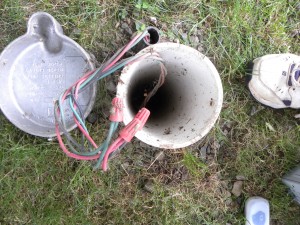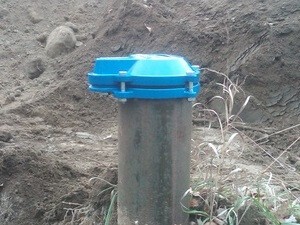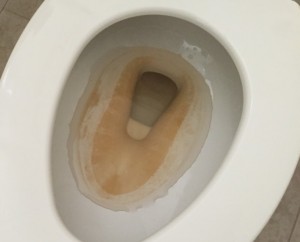B.F. Environmental Builds Expertise into New Water Quality Mobile App – Know Your H20?
B.F. Environmental Builds Expertise into New Water Quality Mobile App
Company experts have developed a new tool that will help families stay healthy
WILKES-BARRE, PA—September 22, 2015—B.F. Environmental Consultants, an environmental consulting firm providing a range of services throughout the Northeast, announced today the launch of a new mobile app that will make it possible for homeowners to get answers about the quality of their drinking water. Brian Oram, a professional geologist and soil scientist and founder of B.F. Environmental Consultants, developed this new diagnostic tool, called “Know Your H2O?”
“Consumers have fully embraced mobile technologies. If we want to help them, we’re going to have to make our information available to them through their IOS and Android devices,” Oram said. “This new app will put actionable information about water quality into the hands of homeowners all across the country. I’m very proud of this new product.”
Know Your H2O? relies heavily upon the massive online water quality resource the company has made available through the launch of its Water Research Center website. The first version of the software helps consumers diagnose potential water quality problems by exploring aesthetic problems, physical problems, health concerns, or specific problems in their homes. The app is supported by additional content that is directly linked to the Water Research Center.
“This tool helps consumers diagnose problems, but then goes beyond that to provide recommendations for further testing or corrective action,” Oram said. “The app is based on a holistic approach and is guided by concerns about our water, homes, and health. It is a comprehensive tool that can be used by any homeowner, building inspector, water quality professional, or water treatment professional to diagnose a problem and determine next steps.”
For more information about the mobile app or to download your own free copy, visit: Drinking Water Diagnostics
About B.F. Environmental Consultants, Inc.
B.F. Environmental Consultants, based in Northeastern Pennsylvania and the Poconos, has been providing professional geological, soils, hydrogeological, and environmental consulting services since 1985. The company specializes in the following areas: hydrogeological and wastewater evaluations for siting land-based wastewater disposal systems; soils consulting (soil scientists), environmental monitoring, overseeing the siting, exploration, and development of community/ commercial water supply sources; environmental training/ professional training courses, and other environmental services. For more information about B.F. Environmental Consultants, visit www.bfenvironmental.com and www.water-research.net.
B.F. Environmental Partners with Nonprofit to Share Environmental Data
B.F. Environmental Partners with Nonprofit to Share Environmental Data
This partnership allows consumers to know about environmental dangers near their homes
WILKES-BARRE, PA—September 25, 2015—B.F. Environmental Consultants, an environmental consulting firm providing a range of services throughout the Northeast, announced today that it will begin making detailed environmental risk reports available to consumers through its partnership with Keystone Clean Water Team, a Pennsylvania-based non-profit. The new program has been launched. The program provides detailed information regarding existing and historic environmental hazards in communities across the country.
“A great deal of environmental risk data is available today but little if any of it is being made available to consumers,” said Brian Oram, a professional geologist and soil scientist and founder of B.F. Environmental Consultants. “By working with the Keystone Clean Water Team, we’re able to share this information with homeowners so that they will know what dangers are lurking in their neighborhoods and have some idea about what they can do about them.”
As part of the program, B.F. Environmental works with a national environmental database search company to identify possible sources of environmental contamination and then augments that data with information from its proprietary information sources, including its Know Your H2O? app and its online Water Research Center. The reports available to consumers provide a snapshot of the current and historic environmental concerns and hazards that might impact a property as well as a review of select criminal activity.
“The combination of the mobile app, customized reports, research reports, and water testing services will help citizens identify the environmental hazards present in their communities and help them address concerns they have about their city water, well water, or local stream water quality,” Oram said. “We are very proud to link these programs to help identify the little known hazards that affect consumers, identify the possible causes for water quality issues and provide assistance in diagnosing problems.” Learn More at Keystone Clean Water Team?
About B.F. Environmental Consultants, Inc.
B.F. Environmental Consultants, based in Northeastern Pennsylvania and the Poconos, has been providing professional geological, soils, hydrogeological, and environmental consulting services since 1985. The company specializes in the following areas: hydrogeological and wastewater evaluations for siting land-based wastewater disposal systems; soils consulting (soil scientists), environmental monitoring, overseeing the siting, exploration, and development of community/ commercial water supply sources; environmental training/ professional training courses, and other environmental services. For more information about B.F. Environmental Consultants, visit www.bfenvironmental.com and www.water-research.net.
Ben Franklin’s SGICC Releases Updated Study Summarizing Shale Gas Wastewater Treatment and Disposal
Ben Franklin’s SGICC Releases Updated Study Summarizing Shale Gas Wastewater Treatment and Disposal in Pennsylvania in 2014
STATE COLLEGE, PA – In 2012 the Ben Franklin Shale Gas Innovation & Commercialization Center (www.sgicc.org) commissioned a study on the status of wastewater being produced in the Commonwealth of Pennsylvania. Now, three years later, SGICC is updating the report, not only because of the slowdown in the drilling process across the Commonwealth, but also due to the rapid change the shale industry has made in management techniques for the wastewater from shale gas and NGL extraction. See the new 2015 report, as well as the 2012 version, on the SGICC web site at http://www.sgicc.org/research–reports.html.
SGICC hired Wunz Associates, LLC to undertake the study as a follow up to their 2012 effort. An exhaustive search of the Pennsylvania Department of Environmental Protection (PADEP) wastewater reporting records was undertaken, coupled with discussions with leading companies treating the wastewater for the industry. In addition to posting the Wunz Associate report at the link above, a second report generated by Eureka Resources, LLC regarding their Standing Stone treatment facility operations in Bradford County, PA and published in SPE International in 2015 is also available.
The most significant finding in the 2015 Wunz report is that volumes classified as “produced water” exceeded those classified as “frac fluid” in 2014. Bill Hall, SGICC Director notes, “This has occurred largely due to the slowdown in drilling and fracturing of wells by the industry and could reverse again in the future when natural gas and NGL prices rebound and drilling picks up again. Additionally, the amount of produced water is likely to decline over time since it is generated in proportion to the amount of gas or NGLs a well is producing, and that tends to drop off fairly rapidly after the initial years of production.”
Hall also stressed that the majority of the wastewater generated as both “produced” and “frac fluid” are recycled by the industry. In fact, the PADEP records indicate that over 91% of the water is recycled by being used in a future completions project. Recycling is typically done after the water is partially treated to remove solids and other unneeded constituents.
“There may be a point in the future where total frac flowback fluid and produced water volumes do exceed the total volume of water used to fracture wells in the state. But that point has not been reached yet,” noted Hall. “The industry continues to look for innovations in the area of shale wastewater treatment and disposal to address future challenges.”
Online Training Courses
Hydraulic Fracturing (Fracking) – Environmental Issues
Hydraulic Fracturing – The Process
Industrial Water Treatment and Underground Injection Control
Comprehensive – Petrochemical – Shale Gas Course
Big Bass Lake Presentation on Well Water Poconos Monroe Wayne County Pennsylvania
The Keystone Clean Water Team was invited to Big Bass Lake to discuss groundwater and private well issues with the Association. Great event and a beautiful community in the Poconos in Gouldsboro, Pennsylvania. The presenter was board member and manager Mr. Brian Oram from B.F. Environmental Consultants, Inc. During the presentation, we discussed:
a. Need for private well owners to be proactive.
b. The connection between groundwater and surface water.
c. Private well water testing – common problems and basic solutions.
d. The real hazards in a community may include other private wells.
e. Introduced the Know Your H2O? Program
Very solid Event. A Private Well Owner Presentation is available for review.
Supportive Links
Our Educational Booklet on Drinking Water
Know Your H2O? Program
OuR PSAs on Water
Why Should I Test My Well Water?
Mail Order Water Testing Program
Get Your Community Hazard Report for Real Estate Properties (USA Search- Custom Reports).
Most Common Questions
1. How to Shock Disinfect a Well?
2. Where do I get sanitizing tablets? (Follow link or check with local well drilling contractor)
[amazon_link asins=’B00L9FFQRW’ template=’ProductAd’ store=’webdespro-20′ marketplace=’US’ link_id=’8f2e2b71-bd15-11e7-aecf-87f1297ec902′]
3. Is radon in water an issue? Maybe – get more information, but first priority is to get the radon level check and run a long-term radon test. Radon by zip code (PA).
4. Red water – is the only solution a water softener?
5. My water is great but it turns blue and tastes metallic?
6. My water stinks. What is up?
7. I have a bacteria problem – do i need to install a UV system and spend $ 1500.00. Maybe- but first you should do the following:
a. Inspect the wellhead or top of the well – Is the casing above grade or below. If below grade, it would be advisable to hirer a well drilling contract to extend the casing at least 18 inches above grade.
b. Does water sit near the wellhead? – if so – divert the water.
c. Do you have a sanitary well cap? No sure – this is a sanitary well cap. Do you have one? If not install one.
d. Shock disinfect well and distribution system – see link above with video.
e. Retest – you may need to shock disinfect twice. Example – See Case # 3
Interested in a Community Based Educational Water Testing program for Big Bass Lake – Contact us.
We could use your help – Here is How.
Big Bass Lake Community Association is not just another Pocono Mountain Resort. We are an award winning and Gold Star Certified premier Community located in the Pocono Mountains.
Carbon County Pennsylvania Groundwater Help to Hometown
The Keystone Clean Water Team has its roots in Carbon County, Pennsylvania. The organization is attempting to educate and inform private well owners about issues related to water quality. We were just recently contacted by someone in the Hometown Area that was having a problem. He called and discussed the issues which appeared series. we asked the person to email us with the details = but we have not received the information.
So – We decided to post this message !
1. If you called the Keystone Clean Water Team looking for help and spoke with Brian – please email us a cleanwater@carbonwaters.org. Please provide a full description of the problem and type of information you have available and your street mailing address.
2. If you are having a problem with your well water in Carbon County, PA- please provide us a description of the problem and your mailing address.
3. We do not have the funds to fix any problems, but we do have the opportunity to compile the problems and attempt to compare the problems to known historic environmental hazards in the area.
4. If you are outside of Carbon County, PA and are having a problem – we would be happy to review any data, but we would also suggest running a Neighborhood Environmental Hazard Report.
Everything we do began with an idea.
Keystone Clean Water Team is a 501(c)(3) IRS approved nonprofit, volunteer organization and your donation is tax deductible to the extent allowed by law. Unsolicited donations are appreciated (Helps us complete our mission), but we also do local educational workshops and local cellphone/small electronic recycling programs. If you would like to set up a program to help recycle cellphones at an event, business, or other organization. Through our program we can recycle cell phones, iPods, game systems, and small digital cameras. If your interested, please contact us. Our new PSAs.
Help the Organization and Get Your Water Tested or Order the Private Well Owner Guide (proceeds benefit This Organization). Water Science Basics!
For more information, please go to KCWT’s About Page or contact us. Follow us on Twitter
Wastewater Used to Map Illegal Drug Use
Environment News Service
CORVALLIS, Oregon, July 15, 2009 (ENS) – For the first time, patterns of illegal drug use across a state have been mapped using a method of sampling municipal wastewater before it is treated.
Applying analytical methods developed at Oregon State University, researchers from OSU, the University of Washington, and McGill University collected single-day samples from 96 municipalities across Oregon, representing 65 percent of the state’s population.
They tested the samples for evidence of methamphetamine, cocaine, and MDMA, commonly called ecstasy.
Municipal water treatment facilities across Oregon volunteered for the study to help further the development of this methodology as a proactive tool for health officials.
Their findings provide a snapshot of drug excretion that can be used to better understand patterns of drug use in multiple municipalities over time.
The study, published this week in the journal “Addiction,” reports a demonstration of this method conducted by UW drug epidemiologist Caleb Banta-Green, OSU chemist Jennifer Field, OSU toxicologist Daniel Sudakin, McGill spatial epidemiologist Luc de Montigny and others.
“This work is the first to demonstrate the use of wastewater samples for spatial analyses, a relatively simple and cost-effective approach to measuring community drug use,” said lead author Banta-Green.
Meth user (Photo courtesy Eyes of the World Media Group)
“Current measures of the true prevalence of drug use are severely limited both by cost and methodological issues,” he said. “We believe these data have great utility as a population measure of drug use and provide further evidence of the validity of this methodology.”
“Municipalities across the state generously volunteered to help us test our methods by collecting samples more or less simultaneously, providing us with 24-hour composite influent samples from one day – March 4, 2008,” said Field, who led the laboratory analyses of the samples.
Lab tests of the samples showed that the index loads of a cocaine metabolite were significantly higher in urban areas and below the level of detection in some rural areas.
Methamphetamine was present in all municipalities, rural and urban.
Ecstacy was at quantifiable levels in less than half of the communities, with a significant trend toward higher index loads in more urban areas.
The researchers said their study validates wastewater drug testing methodology that could serve as a tool for public health officials to identify patterns of drug abuse across multiple municipalities over time.
“We believe this methodology can dramatically improve measurement of the true level and distribution of a range of illicit drugs,” said Banta-Green. “By measuring a community’s drug index load, public health officials will have information applicable to a much larger proportion of the total population than existing measures can provide.”
The research team recognized that the data used for this study are inadequate as a complete measure of drug excretion for a community or entire state. The team looked at a single day, mid-week sample, for instance. Results might be altered depending on the day or time of year the sample was gathered.
Currently, Field and Banta-Green are working on a project funded by the National Institutes of Health to determine the best method for collecting data in order to get a reliable annual estimate of drug excretion for a community.
NKeystone Clean Water Team Available – Hazards in Community and Drug Labs.




